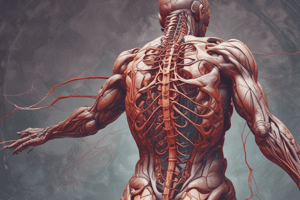Podcast
Questions and Answers
What is the primary difference between visceral and somatic pain?
What is the primary difference between visceral and somatic pain?
- Visceral pain is more sensitive to stimuli than somatic pain
- Visceral pain is poorly localized and produces strong affective responses (correct)
- Visceral pain is only associated with emotional fluctuation
- Visceral pain is more localized than somatic pain
Which organ is more sensitive to stimuli than the stomach?
Which organ is more sensitive to stimuli than the stomach?
- Liver
- Small intestine
- Kidneys
- Pancreas (correct)
What is the reason for visceral pain having somatic components?
What is the reason for visceral pain having somatic components?
- Conjunction of visceral and somatic inputs to the spinal cord and CNS (correct)
- Tissue destruction and ischemia
- Emotional fluctuation and gut-brain interaction
- Inflammation and autonomic instability
What is the suspected relationship between IBS and visceral pain?
What is the suspected relationship between IBS and visceral pain?
What is the effect of fatty acid infusion on induced sadness?
What is the effect of fatty acid infusion on induced sadness?
What is the benefit of probiotic bacteria in certain disorders?
What is the benefit of probiotic bacteria in certain disorders?
What is a characteristic of visceral pain that distinguishes it from somatic pain?
What is a characteristic of visceral pain that distinguishes it from somatic pain?
Why can pain from one intra-abdominal organ refer to another?
Why can pain from one intra-abdominal organ refer to another?
What is the suspected relationship between visceral pain and emotional fluctuation?
What is the suspected relationship between visceral pain and emotional fluctuation?
What can cause pain sensation to be modified distal to the site of visceral inflammation?
What can cause pain sensation to be modified distal to the site of visceral inflammation?
What is a characteristic of visceral pain referral?
What is a characteristic of visceral pain referral?
What is a major limitation of using opioids to treat visceral pain?
What is a major limitation of using opioids to treat visceral pain?
What is a potential alternative to opioids for treating visceral pain?
What is a potential alternative to opioids for treating visceral pain?
What is a common side effect of opioids that can affect the gut?
What is a common side effect of opioids that can affect the gut?
Why may prolonged use of opioids be problematic for visceral pain treatment?
Why may prolonged use of opioids be problematic for visceral pain treatment?
which drug still the mainstay of visceral pain treatment
which drug still the mainstay of visceral pain treatment
Which of the following techniques can block noxious pain impulses originating from abdominal viscera?
Which of the following techniques can block noxious pain impulses originating from abdominal viscera?
What is the primary effect of the aforementioned regional anesthesia techniques on the nervous system?
What is the primary effect of the aforementioned regional anesthesia techniques on the nervous system?
Which of the following blocks is most selective for visceral pain?
Which of the following blocks is most selective for visceral pain?
What is the range of spinal segments that can be blocked to relieve visceral pain?
What is the range of spinal segments that can be blocked to relieve visceral pain?
Which of the following statements is true about the effects of regional anesthesia techniques on the nervous system?
Which of the following statements is true about the effects of regional anesthesia techniques on the nervous system?
What is the outcome of instilling local anesthesia into the peritoneal cavity?
What is the outcome of instilling local anesthesia into the peritoneal cavity?
What is the primary advantage of intraperitoneal regional anesthesia?
What is the primary advantage of intraperitoneal regional anesthesia?
What is the typical depth of insertion for the needle in the posterior and trans-crural approach of celiac plexus block?
What is the typical depth of insertion for the needle in the posterior and trans-crural approach of celiac plexus block?
What is the purpose of using radiography, fluoroscopy, or CT scan in the celiac plexus block?
What is the purpose of using radiography, fluoroscopy, or CT scan in the celiac plexus block?
In what position is the patient placed during the posterior and trans-crural approach of celiac plexus block?
In what position is the patient placed during the posterior and trans-crural approach of celiac plexus block?
What is the angle of insertion for the needle in the posterior and trans-crural approach of celiac plexus block?
What is the angle of insertion for the needle in the posterior and trans-crural approach of celiac plexus block?
What is the characteristic of patients in which determination of the correct vertebral level is imprecise?
What is the characteristic of patients in which determination of the correct vertebral level is imprecise?
What is the initial step in the anterior approach of celiac plexus block?
What is the initial step in the anterior approach of celiac plexus block?
What is the purpose of pushing the aorta aside to the left during the anterior approach of celiac plexus block?
What is the purpose of pushing the aorta aside to the left during the anterior approach of celiac plexus block?
Where should the tip of the needle be placed during the anterior approach of celiac plexus block?
Where should the tip of the needle be placed during the anterior approach of celiac plexus block?
How much solution is injected on either side of the aorta during the modified approach for postoperative pain control in pancreatic cancer patients?
How much solution is injected on either side of the aorta during the modified approach for postoperative pain control in pancreatic cancer patients?
What is the purpose of palpating the pulsating aorta through the lesser omentum during the anterior approach of celiac plexus block?
What is the purpose of palpating the pulsating aorta through the lesser omentum during the anterior approach of celiac plexus block?
What is the main objective of visceral plexus blocks?
What is the main objective of visceral plexus blocks?
What is not a regular finding after a successful visceral plexus block?
What is not a regular finding after a successful visceral plexus block?
What is a possible reason for failure of pain to subside after a visceral plexus block?
What is a possible reason for failure of pain to subside after a visceral plexus block?
What is the primary concern when combining visceral plexus blocks with other regional anesthetic techniques?
What is the primary concern when combining visceral plexus blocks with other regional anesthetic techniques?
What is the typical outcome of a successful visceral plexus block in patients with upper abdominal pain?
What is the typical outcome of a successful visceral plexus block in patients with upper abdominal pain?
What is the most devastating complication of visceral pain blocks?
What is the most devastating complication of visceral pain blocks?
What is the result of damaging the retroperitoneal lymph nodes during visceral pain blocks?
What is the result of damaging the retroperitoneal lymph nodes during visceral pain blocks?
What is the effect of dilation of the capacitance vessels in the splanchnic area during visceral pain blocks?
What is the effect of dilation of the capacitance vessels in the splanchnic area during visceral pain blocks?
What is the most common approach that can lead to subarachnoid injection during visceral pain blocks?
What is the most common approach that can lead to subarachnoid injection during visceral pain blocks?
What is the complication rate of visceral pain blocks, depending on the method used?
What is the complication rate of visceral pain blocks, depending on the method used?
What type of pain is typically associated with visceral pain blocks?
What type of pain is typically associated with visceral pain blocks?
Which type of cancer is commonly treated with splanchnic/celiac plexus blocks?
Which type of cancer is commonly treated with splanchnic/celiac plexus blocks?
What is the primary indication for using visceral pain blocks ?
What is the primary indication for using visceral pain blocks ?
why Visceral pain blocks are usually combined with central neuroaxial regional anesthesia techniques, such as epidural analgesia or paravertebral analgesia in Post-Laparatomy patients?
why Visceral pain blocks are usually combined with central neuroaxial regional anesthesia techniques, such as epidural analgesia or paravertebral analgesia in Post-Laparatomy patients?
which patients benefit from Splanchnic/celiac plexus blocks ?
which patients benefit from Splanchnic/celiac plexus blocks ?
Flashcards are hidden until you start studying
Study Notes
• Abdominal visceral pain is a common finding during the perioperative period, and it differs from somatic pain in many aspects, with not all organs responding similarly to stimuli and some organs being more sensitive.
• The pancreas is more sensitive than the stomach, and tissue destruction, ischemia, and inflammation do not always cause pain.
• Visceral pain is poorly localized, produces strong affective responses, and refers to other locations with intense regional or muscle spasms and autonomic instability.
• The referral properties of visceral pain have been attributed to the conjunction of visceral and somatic inputs to the spinal cord and CNS, which can modify pain sensation distal to the site of visceral inflammation.
• Visceral pain is fervently associated with emotional fluctuation, and IBS is thought to be related to gut-brain interaction and autonomic dysregulation.
• Induced sadness can be attenuated by fatty acid infusion, and increased neural activity in the part of the brain processing emotions can be observed.
• Probiotic bacteria are beneficial in stress-related disorders, such as anxiety and depression, and during the course of common comorbidities and some bowel disorders.
• Opioids are still the mainstay of visceral pain treatment, but their usage has been limited by many side effects, such as decreased gut motility and constipation, sedation, nausea, and vomiting.
• Prolonged usage of narcotics is associated with opioid-induced hyperalgesia and tolerance.
• Acetaminophen, NSAID, and serotonin components have been suggested as alternative treatments, but the results are not specific.
• Visceral pain block techniques, such as spinal anesthesia, epidural anesthesia, paravertebral blocks, and selective sympathetic chain block, can block noxious pain impulses originating from abdominal viscera.
• The celiac/splanchnic nerve block is a specific technique used to block the splanchnic/celiac plexus, which has been approached in many ways, including intraperitoneal regional anesthesia or peritoneal lavage.
• The celiac plexus block can be performed using a posterior and trans-cural approach, which requires radiography, fluoroscopy, or CT scan, especially in lytic blocks.
• The anterior approach involves opening the abdomen and retracting the left lobe of the liver upward, and then inserting a fine 22-G spinal needle alongside the finger and in the loose, retroperitoneal, prevertebral tissue between the IVC and aorta.
• Technical aspects of visceral plexus blocks include the importance of completely disrupting all of the impulse traffic in visceral innervation, as these impulses are widely spread and can be reinstated via very fine nerves.
• There is no established standard technique for visceral plexus blocks, and the success of splanchnic nerve and celiac plexus blocks cannot be verified by any objective signs.
• Complications of visceral pain blocks include hypotension, subarachnoid injection, chylothorax, and vascular trauma, thrombosis, retroperitoneal hematoma.
• The complication rate is between 0.5% and 32%, depending on the method used.
• Indications for a visceral pain block include post-laparotomy pain relief and cancer pain, specifically for biliary and pancreatic cancers.
Studying That Suits You
Use AI to generate personalized quizzes and flashcards to suit your learning preferences.


